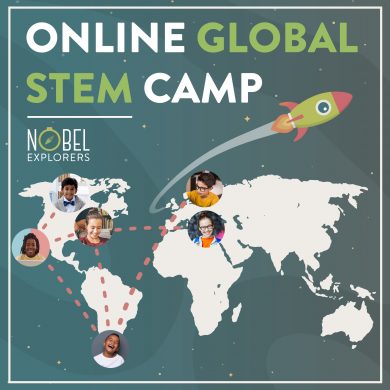Hello, Nobel Explorers! We’re so excited to have you with us starting your journey as a Nobel Explorer!
Aside from tackling some of the most interesting STEM challenges, our intro class will encourage you to learn fundamental teamwork and leadership skills. We defined 7 of these essential skills into specific badges you can earn in the beginning stages of your Explorer journey!
Nobel Explorer Badges are inspired by the World Economic Forum’s top 10 list of skills to have in 2020. These skills set you up for success in the classroom, in work, and in life, and we can’t wait for you to start earning them!
 Heads-up Honcho
Heads-up Honcho
Student uses verbal and nonverbal cues to express active listening.
Showing that you’re not only paying attention to what’s being said but that you’re an active part of the conversation is a skill that is a vital aspect of teamwork. It conveys interest in what’s being said and helps you stay involved throughout the discussion.
 Classy Clarifier
Classy Clarifier
Student lets teammates know if he/she understands them or not.
When someone is addressing you directly, it’s important to convey whether or not you’re able to follow their train of thought. If you are, then you’ll be encouraging them, but if you’re not, then they’ll need to know in order to adapt their presentation accordingly. In good teamwork, misunderstandings are dealt with immediately so that everyone can keep up.
 Super Summarizer
Super Summarizer
Student writes down all of the important agreements, ideas, and conclusions in the public chat.
Group meetings are very dynamic and the topics can sometimes change seamlessly as well as at a very rapid pace. By providing everyone with a written record of all the most important moments of the meeting, you’ll allow your fellow explorers to keep track of what’s been said and move the conversation along accordingly. These notes should be taken live and written inside the public chat for everyone to see.
 Constructive Colonel
Constructive Colonel
Student helps others learn and grow by providing them with constructive feedback.
This just means that giving and receiving feedback require a certain level of skill! Sharing direct information in a kind, yet encouraging manner is something that needs to be mastered but it’s also the most valuable asset in a teamworker’s toolkit.
 Buddy Brainiac
Buddy Brainiac
Student applies brainstorming to generate ideas.
Brainstorming is a useful tool to have at your disposal when a challenge requires a particularly creative resolution. The greater the number of different ideas, the wider the choice for reaching a better solution..
 “To Do” Trooper
“To Do” Trooper
Student identifies tasks and structures them into a to-do list.
Breaking down complex assignments into simple tasks and organizing them on a to-do list allows the team to take on even the most difficult challenges efficiently. It’s the first step to moving mountains, together!
 Captain Convergent
Captain Convergent
Student organizes and structures brainstorming ideas by highlighting the most important ones and grouping together those that are similar.
The true power of brainstorming lies in diversity. But in order to make the most out of these ideas, you need to turn that bundle into a register. Sorting the fruits of your collective expression by importance and clustering together those that are similar provides everyone with a clear overview and makes each session all the more valuable.
Hey there!
You made it all the way to through! We don’t have a badge for this though, but a heartful “Great Job” should work just fine! Now that you’re all caught up with how the badge system works, it’s time to go out there and get as many as you can!
Book a call with Daria, Lead Facilitator, for a deeper understanding of the soft skills badges.
Learn more about Daria.

 Super Summarizer
Super Summarizer “To Do” Trooper
“To Do” Trooper Captain Convergent
Captain Convergent